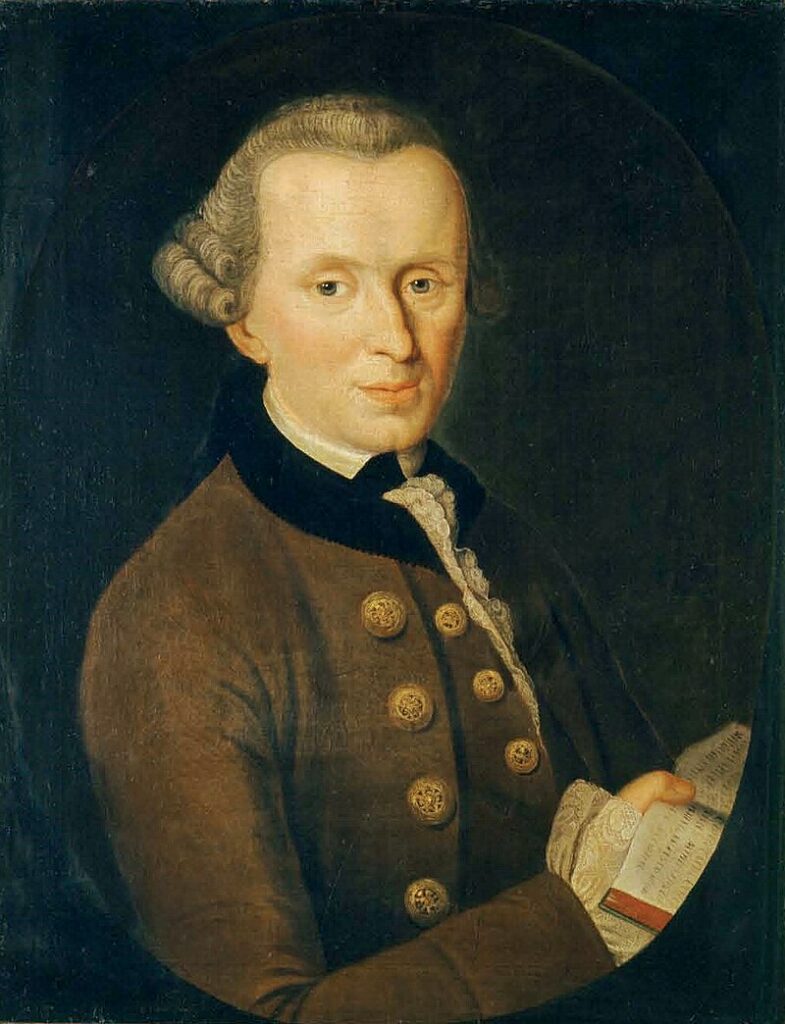Single and hardworking, Immanuel Kant’s life in his hometown of Kaliningrad, on the shores of the Baltic Sea in East Germany (which he never left), is proverbially monotonous.
Immanuel Kant’s family and social environment

Immanuel Kant was born in April 1724. His family had 9 children, and he was their fourth child. He grew up in a religious family, and the religious belief and piety of the family had an important impact on his intellectual and philosophical formation. He had a difficult childhood and youth, but he could turn these difficulties into an extremely positive driving force and learn from it not the spirit of anger, revenge, and despair but the lesson of liberation, mobility, and intellectual maturity. This huge and liberating effort has connected Immanuel Kant’s name and life with the Enlightenment era. Immanuel Kant mentions his parents as worthy examples of purity and piety and writes about his mother: “I will never forget my mother. He was the one who planted and nurtured the first seed of goodness in me. He opened my heart to nature and expanded and awakened my thoughts. His teachings have always had a great and lasting impact on my life.
Nothing in Immanuel Kant’s life (including his appearance) was accidental. With his small and thin body, Immanuel Kant used tailors and tailors to hide his external flaws. He was always well-groomed and fashionable, although he considered it sterile and superficial: a three-cornered hat, a wig, a red coat (long ceremonial coat), shoes with silver buckles, and a sword! He paid a lot of attention to the selection of colors.
Immanuel Kant says: “It is good to adopt primroses and wear a yellow waistcoat with a brown suit!”
Immanuel Kant’s character in everyday life
Immanuel Kant lived without active participation in politics and social life and was free from external influences. His main concern was the world of thinking, cognition, and reflection. He had an extremely hard, productive, and regular life. For example, we can mention Immanuel Kant’s order, precision, way of life, and carefully planned daily walks. ! In this context, he admits that if he needed to auction the property due to financial need, his watch could only be the last object to be put up for sale. In 1760, one of Kant’s relatives named “Von Hippel” staged a comedy show entitled “A Man with a Wristwatch” based on this theme. Every day, whether in summer or winter, his servant “Lamp” (who was an old soldier) entered Immanuel Kant’s bedroom at 4:55 in the morning and shouted: “It’s time!” Immanuel Kant ordered him not to let the master continue sleeping at night and to avoid indulgence. Minutes later, Immanuel Kant was sitting at his desk. At 12:45 p.m., he got up from behind the desk and said to the cook: “It’s a quarter to one!” This sentence means ordering food.
Immanuel Kant had a rule regarding the daily circulation of fixed manners, and as they have quoted, only two factors were able to create a break in this process:
One is the study of “Emile” Rousseau in 1792, and the other is the announcement of the French Revolution in 1789. Immanuel Kant went to bed at ten o’clock every night.
Undoubtedly, the result of this limitless order in the way of life is the continuity of work and thought that nothing can stop. It is as if Immanuel Kant already knows the value and quality of his works. In general, one should never disturb the peace of the philosopher.
The passage of life, time, and health are the concerns of Immanuel Kant’s life
However, the reason for this monotony and obsessive order, in addition to worrying about losing precious time, is the main thing that he pursues as an artist, and his motto is “extending life and not enjoying it.” One of Immanuel Kant’s preoccupations is to grow old as much as possible. . Immanuel Kant considers long life as his art and says: “Maintaining balance, considering all the dangers that life is exposed to and despite the many shocks that exist, is a masterpiece!”
In this way, health is his concern from moment to moment, and he always pays special attention to new medical discoveries. However, he honestly admits his anxiety and fear and believes that the main cause of it is “his wide and low chest, which leaves little room for the heart and lungs to move.” This health concern, along with the sensitivity to the type of clothing and its comfort, causes a strange invention about the sock band: “At that time, men wore long silk socks and fastened them with a sock band with a ribbon.” Immanuel Kant was afraid that the ribbons of the garter would disturb the blood flow. Therefore, he created a device that one of his biographers described as follows: “In a capsule that resembled a pocket watch (but smaller), a small box was placed attached to an elastic string of variable tension, and a hook Hey, he attached it to the two sides of the sock!”
Etiquette of meeting Immanuel Kant
It should also be added that Immanuel Kant’s behavior was not always dry and ascetic. He often had several guests at his table, and the evidence speaks of his meticulous hospitality and the fact that he enjoyed company. Immanuel Kant knew food very well, praised good food, and even once decided to write “Criticism of the Art of Cooking.” But the meal plan was subject to a fixed order like other things in his life. The number of guests, of course, all men, could be changed between three and nine: “This number should not be less than the number of the goddesses of mercy and more than the number of the goddesses of art and literature!”
Immanuel Kant guided the conversation without fear of boredom. In this context, he writes: “There is no better situation than when eating with friends to enjoy the company and mutual and continuous understanding. A repeatable situation”. Immanuel Kant believes that “civilizing a person according to his position in society is not completely effective in improving him from a moral point of view, but the effort to please others prepares him for this.” In other words, the customs of sitting at a dining table and talking. However, it only indicates the reasons for morality and purity, which are fundamental in moral refinement. In addition, Immanuel Kant thinks that eating alone causes a person to get lost in his thoughts, and the brain’s abundance reduces the stomach’s power to digest.
On the contrary, when traveling and walking, one should be alone because talking “which requires opening the mouth” in such conditions causes cold air-breathing and, as a result, rheumatism. As we said, Immanuel Kant was interested in a long life, and to achieve this goal, he believed that single men should live longer than others. According to one of his biographers, Immanuel Kant decided to get married twice but did not do it: “When I could have needed a woman, I could not afford it, and when I could afford it, I was coming, I didn’t need it anymore!”
Immanuel Kant’s personality after death
Nevertheless, the life of the author of “Criticism of Pure Reason” can be a source of imagination and turn into a legend due to his obsessive monotony and piety!
For example, “Thomas de Kenny” was freely inspired by their narratives to paint the painting “The Last Days of Immanuel Kant” (1827) to show the philosopher’s physical decline and death. Also, considering this evidence, a poet like “Heinrich Heine” creates a humorous image of Immanuel Kant in his poem and calls him the “Robespierre” of philosophy. By playing with the contrast between the petty bourgeoisie of the time and the fundamental movement of a philosophical revolution, he concludes that the philosopher has become panicked to the point where he annihilated God, who was annihilated in the “critique of pure reason,” with the movement of a The magic wand revives!
Immanuel Kant gave his last formal lesson in 1796. At this time, his mental ability was reduced, and depression replaced his former cheerfulness. In the last years of his life, he had lost the presence of mind, the ability to recognize old friends, and even the ability to finish simple sentences and became completely numb. Immanuel Kant finally died on February 12, 1804. People from different German cities gathered at his funeral to pay their respects to this great teacher and wise philosopher. Immanuel Kant left a tremendous impact. As far as it can be said, all the literary and philosophical works of the following periods were somehow influenced by his thoughts.
Immanuel Kant’s words
Poetry is the highest art. Immanuel Kant’s sentences
Never treat others like a tool, but consider them an end and a goal. Immanuel Kant’s sentences
Two things inspire my constant admiration: the starry sky above me and the moral judgment within me. Immanuel Kant’s sentences
The sweetest result of precision and discipline is victory. Immanuel Kant’s sentences
Believe in God because you need such a belief. Immanuel Kant’s sentences
Morality should govern art. Immanuel Kant
Behave in such a way that your behavior can become a general rule. Immanuel Kant’s sentences

Leave a Reply